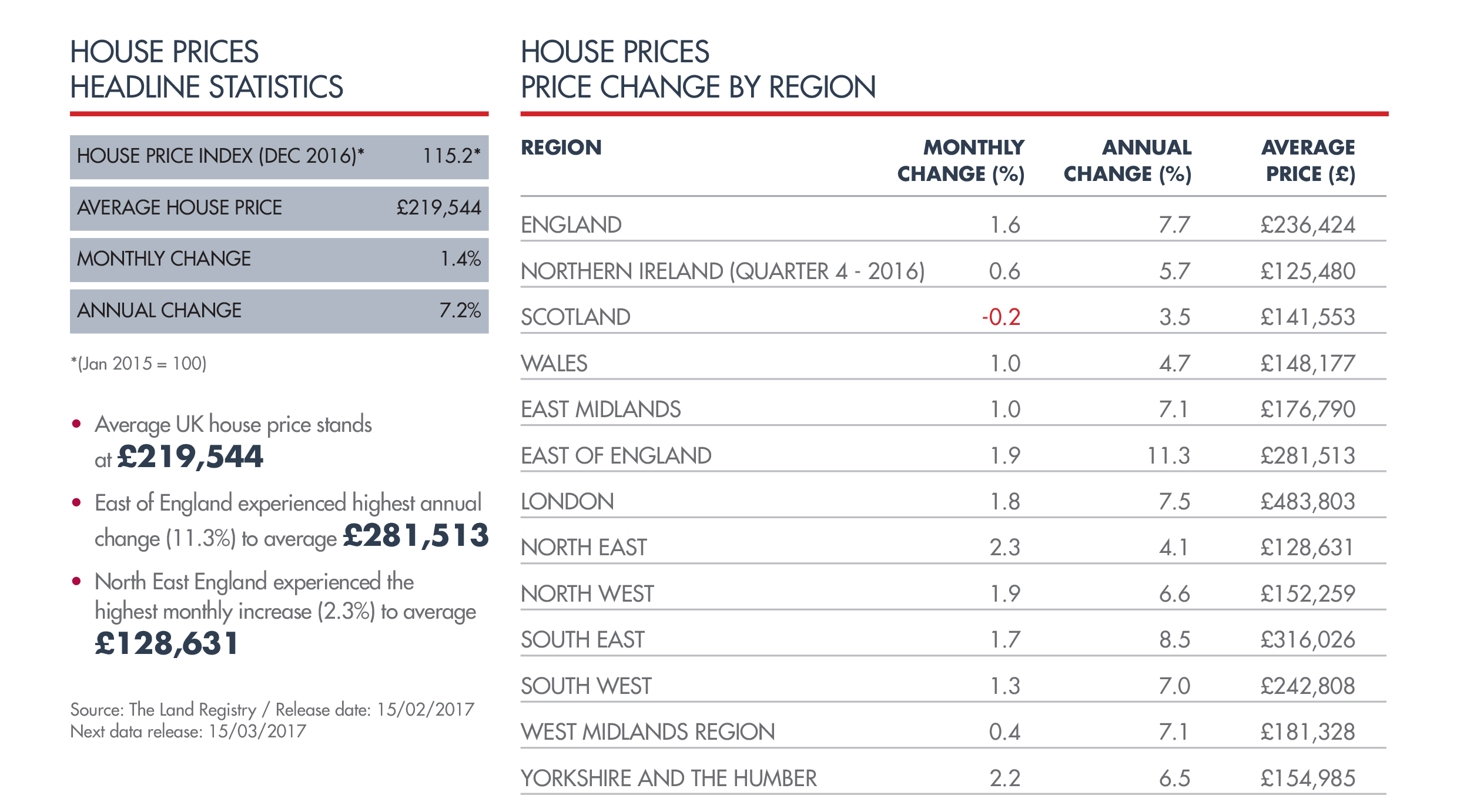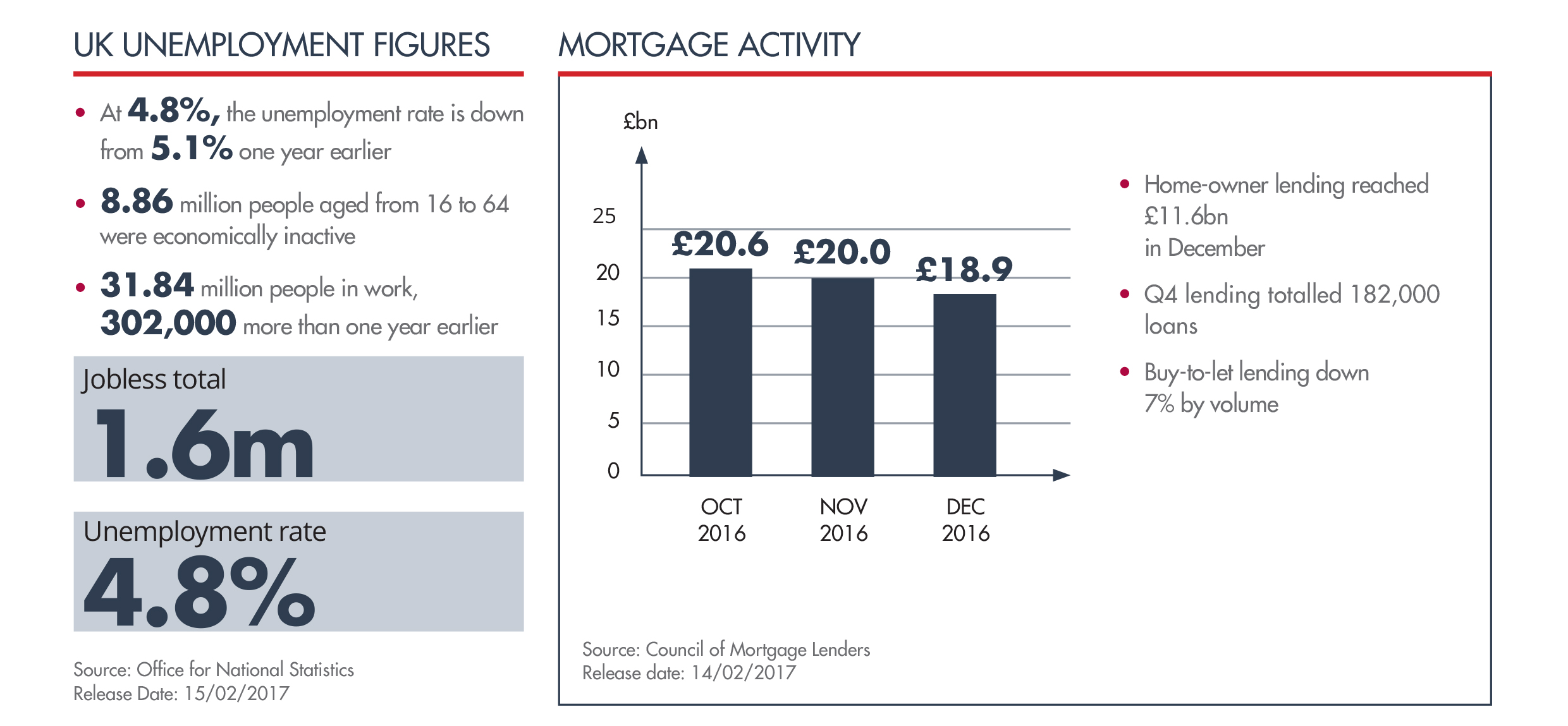PROPERTY MARKET REVIEW FEBRUARY 2017
Our monthly property market review is intended to provide background to recent developments in property markets as well as to give an indication of how some key issues could impact in the future.
DEMAND FOR COMMERCIAL PROPERTY REMAINS STRONG
According to the latest UK Commercial Property Market Survey for Q4 2016, from the Royal Institution of Chartered Surveyors (RICS), demand for commercial property rose for the second quarter running following the Brexit vote. Investment enquiries rose across all sectors.
The survey outlines that 21% more of their respondents recorded an increase in demand in Q4 2016, up 9% from Q3, as overseas investors entered the market again, with 20% of respondents recording a rise in enquiries from foreign investors, up 7% on the previous quarter, partly due to the devaluation of Sterling.
Across London, 62% of respondents believe the market is in the early to mid-stages of a downturn, an increase of 44% in Q3. Feedback across the rest of the UK is more upbeat. When London is excluded, 62% of respondents feel the commercial property market is in the upturn phase of the cycle.
BUSINESS RATES REGIME CALLED INTO QUESTION
The Chief Economist of the Confederation of British Industry, Rain Newton-Smith, has recently called on the government to clarify its long-term intentions around its outdated commercial property tax, known as ‘Business Rates’.
In advance of the Spring Budget, he said that the Government should consider tying any additional tax burden on commercial businesses to the Consumer Prices Index from the 2018/19 tax year.
He commented: “In a more challenging economic environment, the Government must be careful not to put further pressure on firms.” He went on to add: “Top of the list for the high street and our manufacturers is for the Government to tackle the UK’s outdated business rates system, as this seriously risks impairing their ability to deliver the jobs and investment in our economy.”
The business rates bill for the City of London is set to rise by £1.4bn over the next five years, a sharp 33% increase. Rising rates, combined with Brexit, could serve to undermine the City’s drive to retain its standing as a global financial centre.
SCOTTISH OFFICE MARKET BUOYANT
Recent Market Watch research from Savills, reveals that despite a year of political uncertainty, the Scottish office market experienced a strong finish to 2016, with take up totalling 694,849 sq. ft. for Q4, 9% above the quarterly average of 640,352 sq. ft.
Prime yields also held steady, with Aberdeen experiencing a 7.25% average yield, and Edinburgh and Glasgow averaging 5.5%. The research highlights lower volatility in returns for the Scottish office market compared with the rest of the UK, with returns set to be income driven into 2017 and yields remaining attractive relative to the rest of the UK office market.
The Business rates bill for the city of London is set to rise by £1.4bn over the next five years, a sharp 33% increase.


It is important to take professional advice before making any decision relating to your personal finances. Information within this document is based on our current understanding and can be subject to change without notice and the accuracy and completeness of the information cannot be guaranteed. It does not provide individual tailored investment advice and is for guidance only. Some rules may vary in different parts of the UK. We cannot assume legal liability for any errors or omissions it might contain. Levels and bases of, and reliefs from, taxation are those currently applying or proposed and are subject to change; their value depends on the individual circumstances of the investor. No part of this document may be reproduced in any manner without prior permission.
